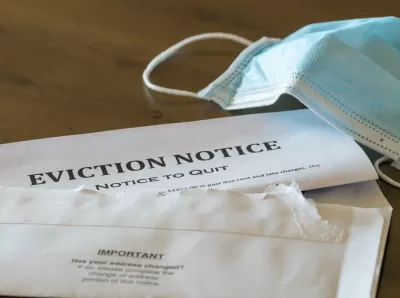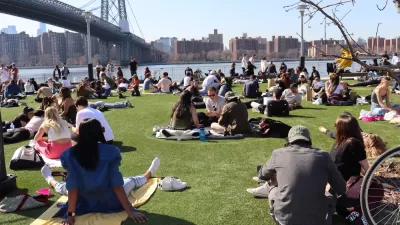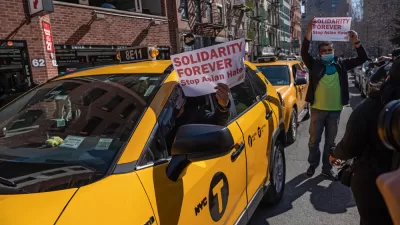A new study connects evictions to the spread of the coronavirus. Evictions continued in huge numbers during the pandemic despite a patchwork of eviction protections at multiple layers of government.

New research quantifies grim public health effects of evictions during the pandamic. "[E]victions between the beginning of the pandemic and the CDC’s national eviction moratorium in September led to 433,700 excess COVID-19 cases and 10,700 additional deaths," reports Jeff Andrews, who is sharing the news of a study published this week, led by Kathryn Leifheit at the University of California, Los Angeles.
According to the research, the same households that are more likely to be infected, low-income Black and Latino households, are also more likely to be evicted. "After an eviction, people often bunk with family or friends (or, if they have no other options, go into the shelter system), and that creates more points of social contact, opening up the risk of disease transmission," explains Andrews.
The news puts in stark terms the inadequacies of the eviction protections put in place by the CDC and many state and local governments around the country during the pandemic, as unemployment spiked as a result stay-at-home orders and other public health restrictions around the country.
For more insight into the findings of the study, Leifheit also sat down for an interview with Mary Louise Kelly at NPR. The discussion includes more detail on the patchwork of eviction protections implemented by federal, state, and local agencies during the pandemic, and how it came up short in protecting vulnerable populations from the economic and health ravages of the pandemic. Texas is singled out as a place where lifting an eviction order early in the pandemic led to a large number of infections.
FULL STORY: Evictions Caused More Than 10,000 COVID Deaths

Alabama: Trump Terminates Settlements for Black Communities Harmed By Raw Sewage
Trump deemed the landmark civil rights agreement “illegal DEI and environmental justice policy.”

Study: Maui’s Plan to Convert Vacation Rentals to Long-Term Housing Could Cause Nearly $1 Billion Economic Loss
The plan would reduce visitor accommodation by 25% resulting in 1,900 jobs lost.

Planetizen Federal Action Tracker
A weekly monitor of how Trump’s orders and actions are impacting planners and planning in America.

Wind Energy on the Rise Despite Federal Policy Reversal
The Trump administration is revoking federal support for renewable energy, but demand for new projects continues unabated.

Passengers Flock to Caltrain After Electrification
The new electric trains are running faster and more reliably, leading to strong ridership growth on the Bay Area rail system.

Texas Churches Rally Behind ‘Yes in God’s Back Yard’ Legislation
Religious leaders want the state to reduce zoning regulations to streamline leasing church-owned land to housing developers.
Urban Design for Planners 1: Software Tools
This six-course series explores essential urban design concepts using open source software and equips planners with the tools they need to participate fully in the urban design process.
Planning for Universal Design
Learn the tools for implementing Universal Design in planning regulations.
Caltrans
Smith Gee Studio
Institute for Housing and Urban Development Studies (IHS)
City of Grandview
Harvard GSD Executive Education
Toledo-Lucas County Plan Commissions
Salt Lake City
NYU Wagner Graduate School of Public Service





























